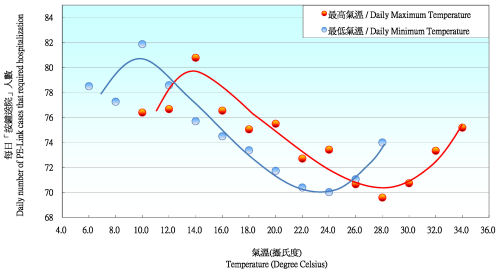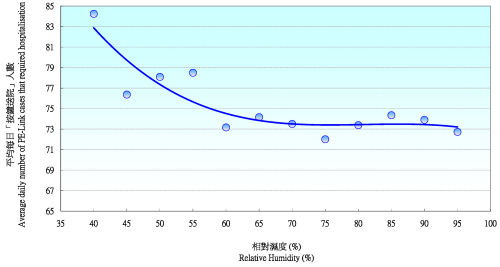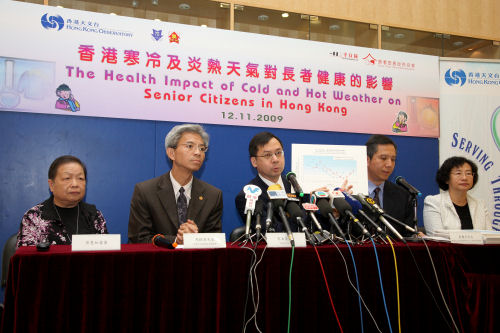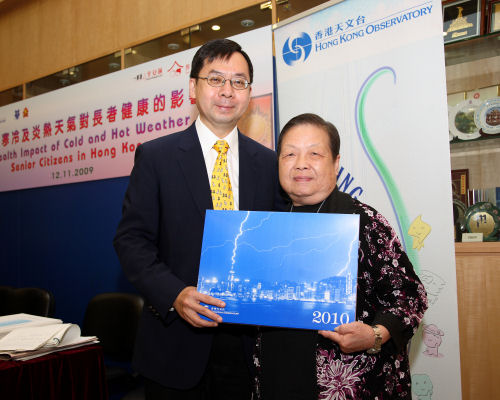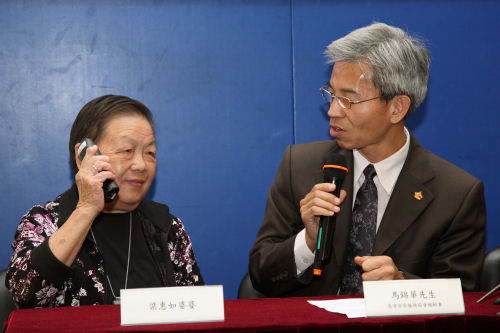Results of study on impact of weather on senior citizens
12 November 2009
| The Hong Kong Observatory (HKO) and the Senior Citizen Home Safety Association today (12 November) announced the findings of a joint study on the impact of cold and hot weather on the health of senior citizens in Hong Kong. The study analysed the daily number of users activating the Personal Emergency Link Service (PE-Link) and requiring subsequent hospitalisation (hospitalised users) as well as the weather data recorded at HKO Headquarters from 2004 to 2008. The results indicated that besides air temperature, relative humidity also affected the health of senior citizens. Dry and cold weather had a particularly significant health impact on them. When the minimum temperature was below 22 degrees Celsius, the number of hospitalised users increased as temperature dropped. The figures were more than 10% higher when the temperature fell below 12 degrees Celsius. When the maximum temperature was higher than 30 degrees Celsius, the number of hospitalised users increased as temperature rose. The figures were more than 7% higher when the temperature reached 34 degrees Celsius or above (Figure 1). Dry weather had greater impact on senior citizens in cool seasons (Figure 2). During the study period, high number of hospitalised users was recorded in about half of the cold and dry days (relative humidity at 70% or below). Executive Director of the Senior Citizen Home Safety Association Mr Ma Kam-wah said the study results would help the association establish measures for cold and hot weather conditions. For example, the association would strengthen the manpower of the Call and Care Service Centre in response to the changes in air temperature and relative humidity, and send recorded voice messages through the "Caring Message Service" (Note) to remind PE-Link users of the expected weather changes to minimise the health impact on them. Director of the Hong Kong Observatory, Dr Lee Boon-ying, said the collaboration between the Observatory and the Senior Citizen Home Safety Association enhanced the understanding of the impact of weather on senior citizens, in particular the impact of dry weather in cool seasons. "We will continue our co-operation to contribute towards the safety of senior citizens," Dr Lee said. As winter approaches, the Observatory and the Senior Citizen Home Safety Association are co-operating to promote the awareness of senior citizens to prepare for the cold weather. With the "Caring Message Service", a Senior Scientific Officer of the Observatory will, through recorded voice messages, remind about 70,000 PE-Link users to keep warm when cold surges arrive or in persistently cold weather. Note: "Caring Message Service" is provided by the Senior Citizen Home Safety Association through an interactive voice response system (IVRS) with autodial function. It delivers greetings, reminders and the latest information to Personal Emergency Link Service users on a regular basis, to help them keep in touch with the community. |
|
|
